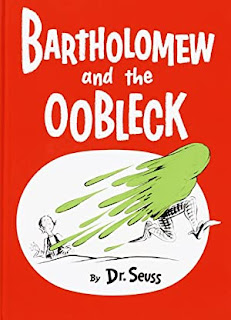In October, Merriam-Webster announced that it had added 455 words. Many of them come from new terms associated with the pandemic and some from general popular culture. My favorite is this one:
"Oobleck : a mixture of corn starch and water that behaves like a liquid when at rest and like a solid when pressure is applied. Oobleck gets its name from the title of a story by Dr. Seuss, Bartholomew and the Oobleck, and is a favorite component in kids’ science experiments."This is almost like seeing the book Frindle come to life. No spoilers. If you haven't read it as a kid, you could still read it as an adult.
This is not the first word coined by Dr. Seuss to make it into the English language. The word "nerd" first appeared in If I Ran the Zoo published in 1950.. He used it rather like Lewis Carroll used Jaberrwocky -- a made-up name for a made-up creature.
And then, just to show them, I'll sail to Ka-troo
And bring back an It-kutch, a Preep and a Proo,
A Nerkle, a Nerd, and a Seersucker, too!
And bring back an It-kutch, a Preep and a Proo,
A Nerkle, a Nerd, and a Seersucker, too!
In 1951, the word had already taken off with th emeaning that we assign it today. Merriam-Webster recounts:
Newsweek carried an article about the latest slang that includes the word nerd. "In Detroit," it notes, "someone who once would be called a drip or a square is now, regrettably, a nerd, or in less severe cases, a scurve."
Unfortunately, the book that book is among the 6 that are no longer published pictured here:
Related: The literary origins of robots







